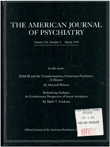New York under the Rivers decision: an epidemiologic study of drug treatment refusal [published erratum appears in Am J Psychiatry 1991 Oct;148(10):1427]
Abstract
OBJECTIVE: To determine the characteristics of cases of drug treatment refusal under the Rivers decision, which mandated court adjudication of such cases, the authors made a retrospective study of all applications for court review during 1 year in New York State inpatient facilities. METHOD: Sociodemographic and clinical characteristics of these 473 cases were compared with those of the 41,535 cases during the same period in which no court review was requested. RESULTS: A 1% prevalence of applications requesting court review for nonemergency administration of medication over objection was found. The patients who refused medication were more likely than the comparison patients to have a crime-associated commitment status, a diagnosis of schizophrenia, and fewer previous hospital days, and they were more likely to be discharged. Medication refusers for whom applications for court review were submitted had relatively longer hospitalizations than the rest of the patients. Almost one-third of the applications submitted were withdrawn before court hearings, yielding a 0.7% prevalence of court- reviewed applications. Ninety-two percent of these applications for medication over objection were approved with virtually no change in the requested orders. CONCLUSIONS: The study findings demonstrate that a front-end judicial determination of competency to refuse medication results in a time-consuming procedure which fails to ensure real due process or provide individualized alternative treatment. A two-tier system with in-house clinical review preceding judicial review is proposed to remedy the deficiencies of the current system.
Access content
To read the fulltext, please use one of the options below to sign in or purchase access.- Personal login
- Institutional Login
- Sign in via OpenAthens
- Register for access
-
Please login/register if you wish to pair your device and check access availability.
Not a subscriber?
PsychiatryOnline subscription options offer access to the DSM-5 library, books, journals, CME, and patient resources. This all-in-one virtual library provides psychiatrists and mental health professionals with key resources for diagnosis, treatment, research, and professional development.
Need more help? PsychiatryOnline Customer Service may be reached by emailing [email protected] or by calling 800-368-5777 (in the U.S.) or 703-907-7322 (outside the U.S.).



